The Samsung 830 256GB SSD is a top pick in this SSD generation given Samsung’s reputation for quality. One can find Samsung SSD offerings inside several OEMs such as Apple and HP so we know the level of testing the controllers and firmware are put through exceed that of small SSD companies. Recently SSD prices have come down a very significant amount to the point that I am no longer recommending anything smaller than 120GB and think that the 256GB SATA III drives are probably the best long-term value. Amidst all of this price cutting, the Samsung 830 solid state drive was one of the last current generation drives to come down in price. Recently the 256GB models have been selling for around $200 making a 256GB drive relatively affordable compared to what we had been accustomed to seeing in the marketplace. I decided to pick a drive up and see how it performs. One thing I did want to draw a little attention to is the fact that Samsung has one of the cleanest designs out there right now. No stickers that make me think my SSD is about to test the standard model of physics. Too bad SSDs are generally inside enclosures, but it is a nice change.
Test Configuration
I am using a Sandy Bridge test bed here as the Cougar Point SATA 6.0gbps controller is perhaps the best 6.0gbps SATA controller on the market at the moment.
- CPU: Intel Core i5-2500K
- Motherboard: ASUS P8H67-M EVO
- Memory: 8GB 1600MHz CL9 DDR3 (4x2GB)
- OS Drive: OCZ Agility 2 120GB
- Additional Drives: Crucial M4 256GB
- Additional NICs: Intel Gigabit CT PCIe x1 network adapter
- Enclosure: Supermicro SC731i-300B
- Power Supply: Supermicro 300w (included in the SC731i-300B)
As with any modern SSD, set the controller to AHCI mode or RAID mode for best performance. Also, installing the Intel RST 10.xx series drivers over the default Windows 7 drivers showed a nice performance gain.
I do think that I will begin using the Intel Z77 chipset in the near future but wanted to provide a baseline using the H67 for the solid state drive reviews.
The Tests
It is important, especially with SSDs not to take a single test result at face value. One should look at a few different tests to get an idea of how the drives perform in different scenarios. To this end, AS SSD benchmark, CrystalDiskMark, ATTO and HD Tune Pro all show different facets of performance.
AS SSD Benchmark
AS SSD is a solid benchmark that does not write compressible data to drives. The result is perhaps one of the best workstation SSD benchmarks available today.

The Samsung 830 256GB solid state drive does acceptably in the AS SSD benchmark. I was a bit disappointed though in the write speeds which come in below today’s current best in class SSDs. One thing that should be noted is that anything under 125MB/s could be a bottleneck when transferring over gigabit Ethernet networks.
CrystalDiskMark
CrystalDiskMark is another benchmark which gives non-compressible read/write numbers. This is in contrast to the ATTO Benchmark used by LSI/ Sandforce and its partners when they market a given solid state drive.
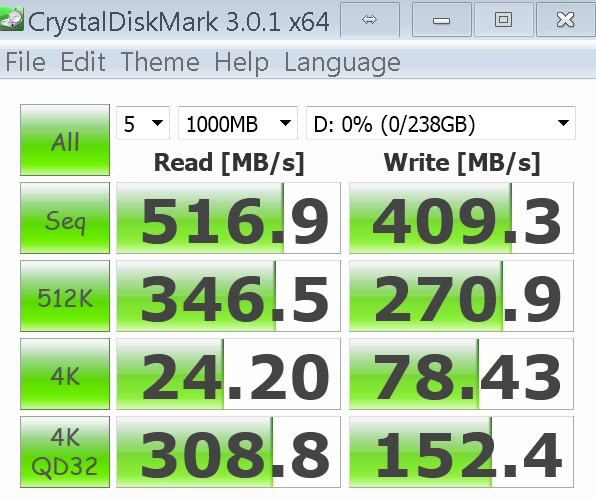
Overall CrystalDiskMark shows solid performance from the Samsung 830 SSD. I would have liked to see write speeds a little higher but the 78MB/s 4K speed is very competitive with current offerings. Even with the newest v1.5 firmware, the OCZ Vertex 4 benchmarks show similar 4K performance. The OCZ Vertex 4 does show better write speeds across the board though.
ATTO Benchmark
The ATTO Benchmark shows some fairly strong performance, I will note that the value of the ATTO benchmark is really to show the best-case scenario. ATTO is known to write highly compressible data to drives, which inflates speeds of controllers that compress data like LSI/ SandForce does prior to writing on a given solid state drive.
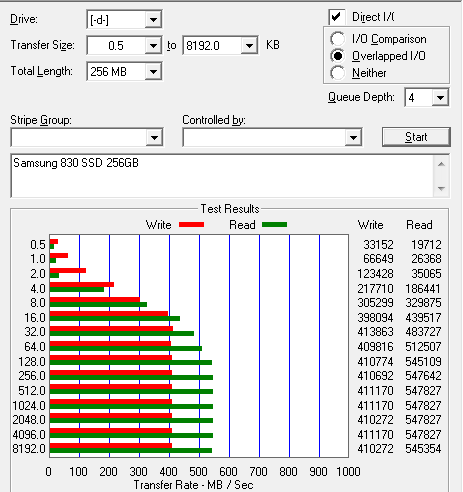
The write speeds of the Samsung 830 256GB solid state drive are a bit lower than we are seeing from current generation solid state drives. Of course, unlike SandForce drives, the Samsung 830 256GB SSD is not inflating these results due to ATTO using compressible data.
HD Tune Pro
HD Tune and its Pro version have been longstanding disk drive benchmarks. I started including the basic benchmark in reviews since I do test a mix of hard drives and solid state drives.

Not the highest read speeds but very consistent read and access times provide a solid showing for the Samsung 830 256GB solid state drive.
Anvil’s Storage Utilities
Anvil is quickly becoming one of the new de-facto benchmarks for hard drives and solid state drives as it allows a lot of customization. This benchmark has been added to the ServeTheHome test suite due to user demand.
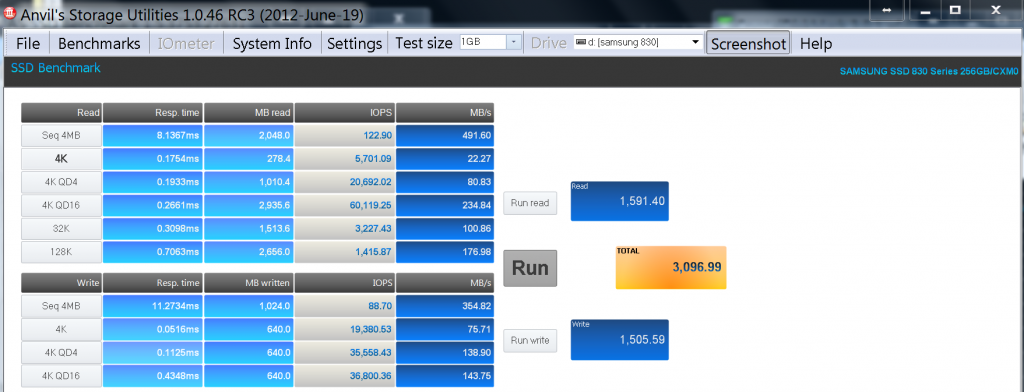
Overall very competitive results here and the drive is able to push over 60,000 IOPS at higher queue depths.
Conclusion
The Samsung 830 is very competitive with the SandForce based drives, and Marvell based drives such as the Crucial M4 256GB and OCZ Vertex 4 256GB even with v1.5 firmware. What Samsung brings to the table is OEM-level reliability. No big OEM wants to see large numbers of returns. Remember Apple’s model is servicing broken laptops in-store which is very expensive compared to OCZ’s model (as an example) of send your drive in and we will mail one back to you. I do not think that most users will be able to tell the difference between the Samsung 830GB and other drives in terms of real-world performance when not looking at benchmarks. For those wondering, I just built a HTPC with an old Intel X25-M 80GB G2 drive and despite having literally stacks of the newest 6.0gbps SATA III drives around, I cannot get more than 0.25s faster boot times on the Core i7-3770K based machine. Right now my guidance is to stay away from Asynchronous NAND based drives like the Corsair Force 3 and the OCZ Agility 3 as there is a noticeable performance decrease there. Among other drives optimize for reliability, warranty, and price for capacity.
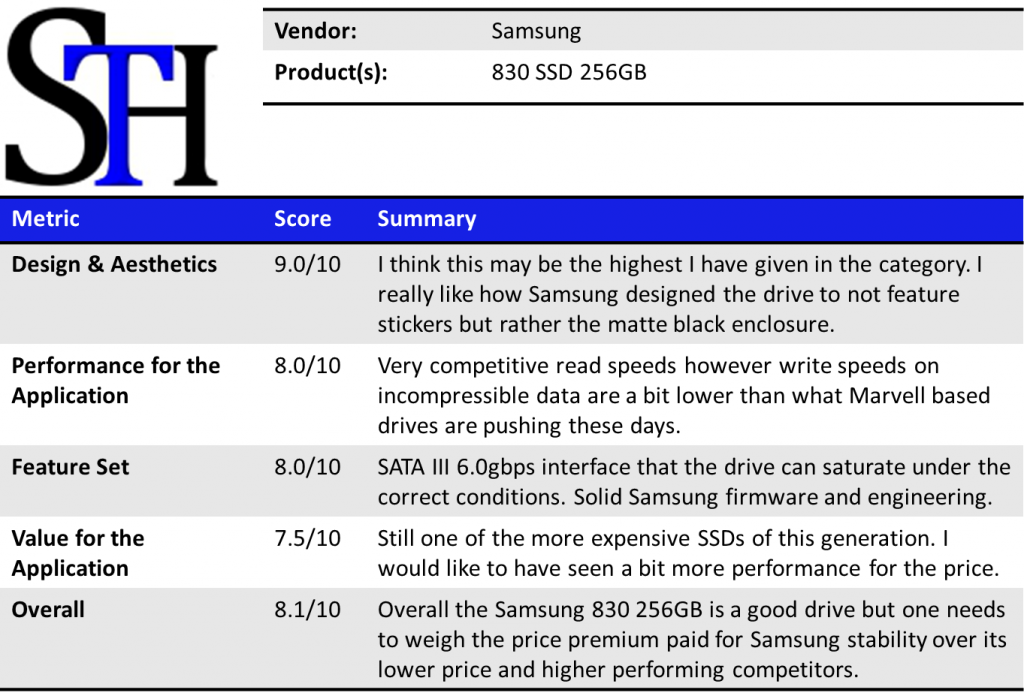


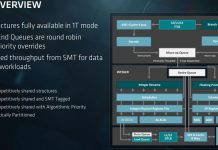

anvil results compared to other drives please
Nice review, all I’d say was that here in the UK the Samsung drives are amongst the cheapest SSDs around. One major component supplier only lists one 256Gb SSD cheaper, and that’s only by £1 so around here its certainly not one of the most expensive SSDs of the generation, quite the opposite.